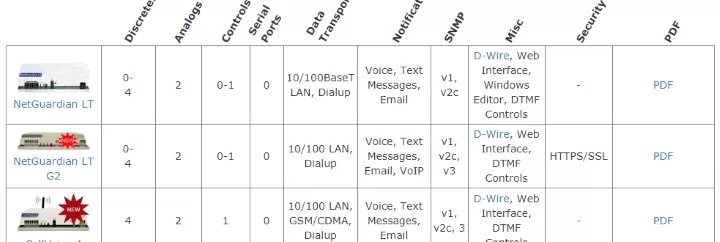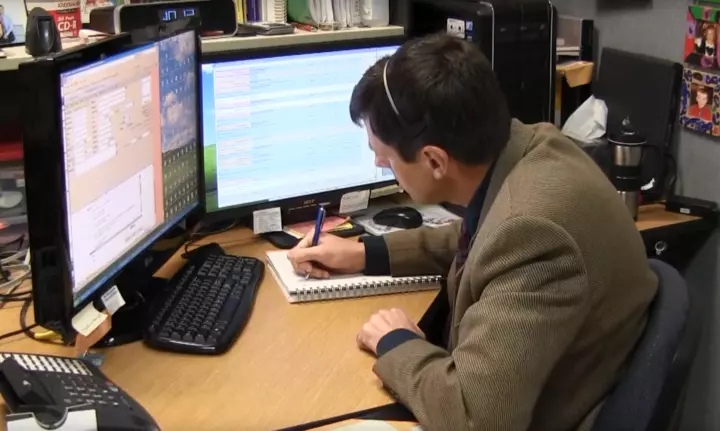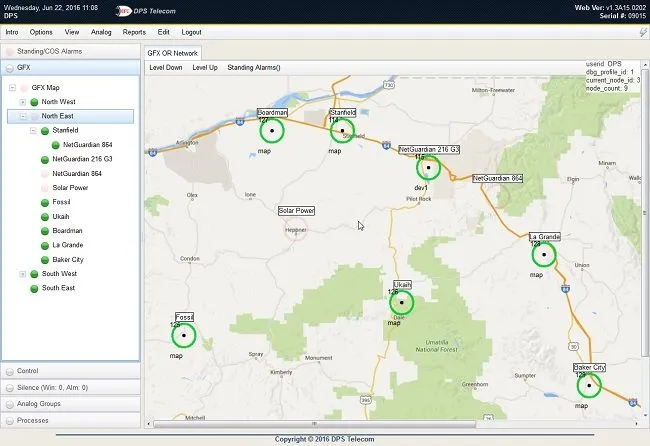Check out our White Paper Series!
A complete library of helpful advice and survival guides for every aspect of system monitoring and control.
1-800-693-0351
Have a specific question? Ask our team of expert engineers and get a specific answer!
Sign up for the next DPS Factory Training!

Whether you're new to our equipment or you've used it for years, DPS factory training is the best way to get more from your monitoring.
Reserve Your Seat TodayA Supervisory Control and Data Acquisition (SCADA) system can be useful in monitoring and control applications by collecting information about your industrial automation processes and analyzing real-time data.
The properties of SCADA systems are complex and they really have to be. The operation that you want to remotely monitor and control is complex, so any SCADA system that offers you these monitoring and control options has to be complex too.
However, it doesn't mean that your decision when you're choosing a SCADA system has to be difficult or impossible.
When planning a SCADA system you should keep some key points in mind. Let's walk through 3 of the things you can look for to help you find the absolute top SCADA system for you.
Many people, when they're evaluating SCADA systems for the first time, really don't appreciate the large breadth that exists in the marketplace. This applies to how much time you'll have to devote to the project and what kind of expertise you have to bring to the table.
In terms of time and knowledge, we have 2 major sub-categories:
Pre-sales and sales experience
Some companies offer you a literal "a la carte" website experience. This means that, if you know exactly what you want in a SCADA platform, you can access their huge list of items, click on the things you need, add them to your shopping cart, get a quote, order it and have the stuff show up at your dock.

Buying your remote monitoring and control system online without any human interaction can be OK and even practical if you have experience and know what you really need.
That's awesome if you know exactly what you're doing, because how could a company offer you a lower cost experience than that? It's just a website, so there's not even a human involved on their side. No one looked at your design, no one had to approve anything, you just knew what you wanted and you ordered it.
Keep in mind, though, that you have to be careful. If you don't, you're at risk of ending up with the wrong stuff, and then you'll really not have a low-cost solution at all - you'll have start over.
On the complete opposite of the spectrum, you have full-service manufacturers and vendors.
Instead of knowing exactly what you need right out of the gate, you'll tell them: "Look, this is my system. I'm having these problems. I'd like to accomplish these few things. What have you got for me?"
What you should get in return is a quote with a full application diagram, an explanation of what they heard you talk about, and how this system would solve that. Then, you'd be able to take that design and run with it.
This type of service might cost you a little more, but over the long haul - unless you know exactly what you're doing - it can be a much better option.

When you call a full-service manufacturer you should get in touch with their experienced sales team. They'll want to know all your alarm monitoring needs, so they can come up with your perfect-fit solution.
After you receive the equipment, what kind of programming is involved?
If you know how to program and have experience doing this, you can order Programmable Logic Controllers (PLCs). They're small little components that you can program yourself. With them, you can totally customize your SCADA system to do exactly what you need and have all kinds of custom functions. That's great, but - of course - you have to be able to program to do it.e
On the other side, you have Remote Terminal Units (RTUs). They have a lot more built-in intelligence. These usually small rack-mounted boxes have features that you would simply configure in a menu, rather than the program from scratch yourself.
If you're just getting started with SCADA or if you just want something you can execute quickly, the RTU can be a better option. In order to make the best decision, you need to decide where you're on that spectrum as well.
At this point in your research, I'm sure you'd love for me to tell you: "Go to XYZ corporation and get their SCADA system. It's amazing, and it's going to be the best one for you."
I can't possibly do that, because the SCADA networks are not supposed to be cookie-cutters. They should be customized to match your operation, so there's no way I could recommend something specific. What I can tell you, though, is a couple of key things that you need to keep in mind when you're SCADA planning.
Capacity
No matter how much stuff you have to monitor and control, your SCADA system needs to be able to handle that and collect all data. You should think about your system's physical and software abilities to deal with everything you need to keep an eye on.
Also, what does the licensing look like? Do you have to pay extra for a certain number of devices? It's important to be aware of that when you're planning.
System Integration and Compatibility
Do you need to have certain communication protocols or transports to make sure that your new SCADA equipment can interact with everything else you've got? Maybe you've got some gear already that uses a certain protocol. If so, your SCADA system better support it or you're going to be in trouble.
The same thing goes for transport. Do you have legacy serial? Do all of your devices support IP? What do you have going on, and what will your vendor need to connect to when they set up your new SCADA system?
Human-Machine Interface (HMI) - aka Master Station
In a typical SCADA system architecture, the HMI will be some kind of screen that will display your information. This way, you and your team will be able to clearly to understand, monitor, and control equipment.
Similarly, if you want email alerts or text message alerts, make sure your system supports that.

Web-based, intuitive user interfaces in a SCADA software platform are getting popular for a reason. When an alarm occurs, an HMI like the DPS Telecom T/Mon alarm system presents the data in a form that is usable by the human network operator.
Your operation is very important, and you need to protect it with a good SCADA system. You obviously don't want to use technology that's brand new, that's a prototype, or that's never been used before. You want to choose something proven, that you can depend on.
However, what does that actually mean?
One excellent thing to look for on the technical side is open protocols. You don't want to choose a system that's based on a proprietary closed protocol that only one manufacturer supports. Not just because that's a huge business inconvenience (SCADA vendors will trap you into future purchasing from just them), but also because open protocols that are supported by many manufacturers are much more proven and reliable. They're simply in use more.
Also, the following standard aspects that you'd expect when you're trying to find proven technology are:
Referral lists and case studies
Always ask your prospective vendor: "Who uses your product?"
Independently, make the vendor prove it. Ask for testimonials, referral lists, and case studies. Call the contacts as well, and you'll have a better idea of what your potential vendor is all about.
Are there any big-name companies using this gear?
Big-name companies have a lot of resources and obviously they can get just about anything they want. This means that they decided to buy this determined gear for a reason.
Is this some kind of new company that has a new solution that really hasn't seen much deployment yet?
Look for vendors that have an extensive history of tested and proven devices. Some companies will also give you the opportunity to use and test their devices on your real-world environment, with a full return guarantee.
If you'd like to talk with an expert about your SCADA project, we'd be happy to work with you.
Since 1986, DPS has been a trusted provider of monitoring and control solutions. We think out-of-the-box and believe that your solution must be personalized for your unique network, so that's what we specialize in.
Our experienced sales team is committed to giving you the best monitoring advice, and we don't force you to buy anything more than what you need.
We make sure to get to know your scenario and monitoring requirements, so we can propose what we think is the perfect-fit solution for you. We also provide resources like clients' testimonials, web demos, and app drawings so you can absolutely make an informed decision.
Our proven technology is not only tested in our labs, but also is backed-up by a 30-day, no-risk, money-back guarantee. If you buy any of our devices and are not satisfied with it, for any reason, simply return it for a full refund.
With a client-first philosophy, we truly aim to offer the best service and value for your money, independently of what you need.

Andrew Erickson
Andrew Erickson is an Application Engineer at DPS Telecom, a manufacturer of semi-custom remote alarm monitoring systems based in Fresno, California. Andrew brings more than 19 years of experience building site monitoring solutions, developing intuitive user interfaces and documentation, and opt...